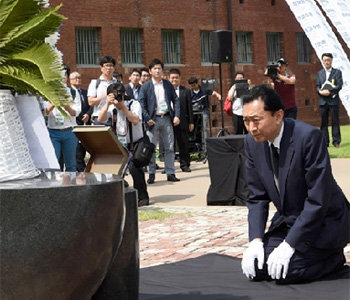Former Japanese premier Hatoyama says Abes statement should include apology
Former Japanese premier Hatoyama says Abes statement should include apology
Posted August. 13, 2015 07:28,

Yukio Hatoyama (68), former Japanese prime minister, visited the Seodaemun Prison History Hall in Seoul on Wednesday, and said I sincerely apologize for Japans 35-year colonial rule of Korea. It is the first time in 14 years that a former or incumbent Japanese prime minister has visited the Seodaemun Prison since then incumbent Junichiro Koizumis visit to the prison in October 2001.
Hatoyama, who arrived at the Seodaemun Prison History Hall at 2 p.m. on the day, three days before the 70th anniversary of Koreas liberation from Japan, started his tour at Cell 8 where Patriot Yoo Gwan-soon was imprisoned, continued his inspection tour in succession of the exhibition hall, central cell and Cell 11, before offering flowers at the memorial stone for patriots in the back of the prison. After taking deep bow in front of the memorial stone, he paid silent tribute with his two hands together for about 30 seconds. Earlier in 2001, Prime Minister Koizumi paid silent tribute with his two hands together after placing flowers at the podium when he visited Korea, but he did not take deep bow.
At a press conference that followed, Prime Minister Hatoyama said, During Japans colonial rule, many people, including Yoo Gwan-soon who struggled for independence movement and demonstrations were imprisoned (in this place), were tortured and lost their lives, adding, I am truly sorry, and make sincere apology. On Prime Minister Shinzo Abes statement on the "70th anniversary of the end of the war," which will be publicized around Saturday, Hatoyama said, The statement should include historical facts such as Japan colonized Korea and invaded into other countries including China, adding, Without fail, the statement should contain sense of reflection and message of apology.
Hatoyama is visiting Korea to attend the "2015 East Asia Peace International Conference," which will take place on Thursday and Friday to mark the 70th anniversary of Koreas liberation. He achieved switching of power from the Liberal Democratic Party to the Democratic Party of Japan for the first time in 54 years in August 2009. The former prime minister has been constantly criticizing misguided understanding of past history among conservative militarists within Japan since his retirement as prime minister the next year.
irontiger@donga.com
Headline News
- Joint investigation headquarters asks Yoon to appear at the investigation office
- KDIC colonel: Cable ties and hoods to control NEC staff were prepared
- Results of real estate development diverged by accessibility to Gangnam
- New budget proposal reflecting Trump’s demand rejected
- Son Heung-min scores winning corner kick







